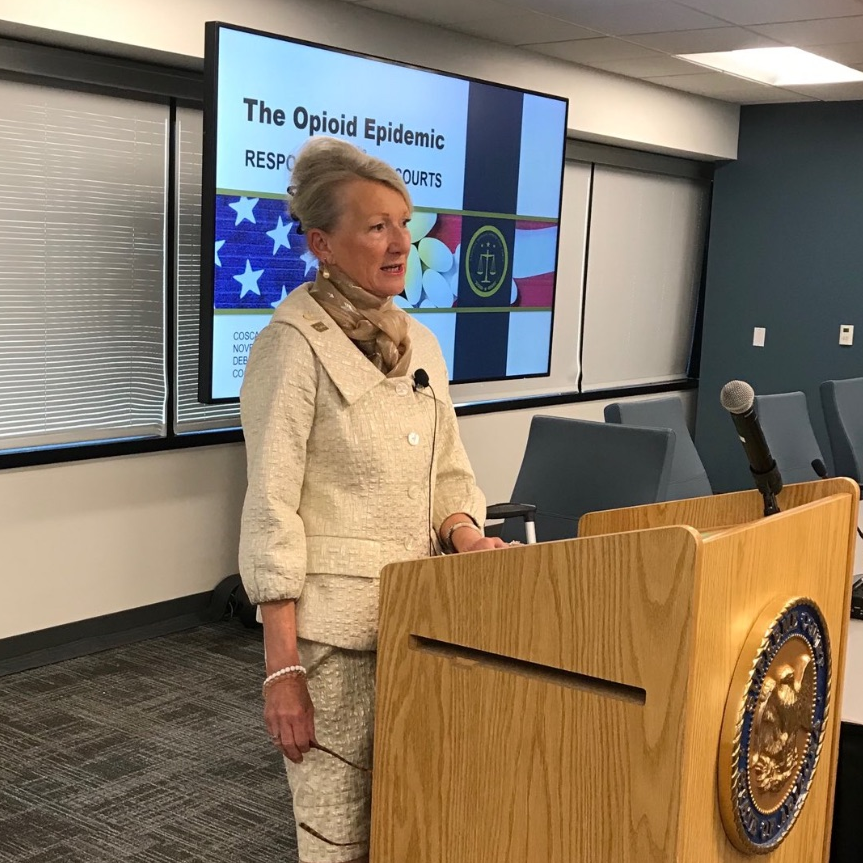The opioid epidemic is an unprecedented public health crisis that affects millions of families nationwide each year, costing our nation over $1 trillion to date. Tennessee Supreme Court Administrative Office of the Courts Director Deborah Taylor Tate has been a national leader in identifying the state courts as places where innovative strategies can be implemented to curb opioid abuse and improve the lives of those with substance abuse disorder.
As Co-Chair of the National Judicial Opioid Task Force, which was created in 2017 to better understand that courts at all levels have been increasingly impacted by the opioid epidemic—whether in cases involving divorce, custody, foster care, bankruptcy, guardianship, business, workers compensation or eviction—Tate has been a strong advocate for addiction services rather than jail.
“Interaction with the courts is often the best opportunity for people to come in contact with resources and treatment options, and we knew we needed to arm judges with real-life solutions and tools to respond,” said Tate. Here in Tennessee, all judges have been trained on brain science, the impact of drugs on the brain, and evidence-based practices and programs that are working.
Tate’s Co-Chair, Indiana Supreme Court Chief Justice Loretta Rush, noted, "Whatever the reason, one fact remains: the state court justice system is now the primary referral source for addiction treatment in the country.”
As Director Tate has emphasized, one of the primary ways that the opioid epidemic has affected the system is by steeply driving up the number of kids entering foster care.
Facts like these have been driving forces behind the State of Tennessee’s groundbreaking efforts to curtail the opioid epidemic. In recent years, Tennessee courts have become national leaders in the establishment of court programs and practices designed to tackle the problem, said Director Tate
One of those programs that Director Tate has highlighted for audiences nationwide is Circuit Court Judge Duane Slone’s Recovery Oriented Compliance Strategy docket, which he started in his East Tennessee courtroom several years ago. The “ROCS docket” serves drug offenders who have an urgent need for treatment but who are not considered high risk enough to qualify for resource-intensive Drug Recovery Court programs. This large pool of previously underserved persons includes many pregnant women and mothers of small children. As a result, Judge Slone also assisted in convening the community to launch a residential facility specifically for women facing the possibility of having their children removed. The program has drawn national coverage and has proven to be a huge success, resulting in decreases in jail populations and increases in healthy births.
Another pioneering initiative in the state has been the establishment of Safe Baby Courts. These courts seek to provide stable environments for children zero through 3 years old by working to rehabilitate parents dealing with substance abuse issues. What started as a pilot program in a single county, has since grown to 11 additional counties throughout the state, leading to healthier parents and reunited families.
“We are starting to see results as we implement new innovative programs,” Director Tate said. “Every single judge in Tennessee has received multiple training sessions on the opioid epidemic, and they take that knowledge back to their communities. This battle will be won on the ground with victories in each community by community.”
It is Director Tate’s hope that the work of the National Judicial Opioid Task Force will lead to an outpouring of such innovation. The Task Force’s newly released final report contains guidelines to assist judges in taking more effective steps in the battle against opioids. That final report is the product of three years of field hearings, cross-disciplinary partnerships, and in-depth studies of best practices. It was recently released in Washington, D.C., by the Task Force along with U.S. Surgeon General Jerome M. Adams and Director of the U.S. Office of National Drug Control Policy James W. Carroll. You can read about the NCSC's opioid efforts here: www.ncsc.org/opioids
“Judges must exert leadership and advocate for the availability of quality, evidence-based treatment services as the best and most effective response to the opioid epidemic,” the report concludes.
One of the main recommendations of the report urges judges to favor medication-assisted treatment, or MAT, if appropriate. MAT is the use of federally approved medications with counseling in tandem with behavioral therapies to treat substance use disorders and prevent opioid overdose. Providing drugs to defendants with substance use disorder is an issue some judges have long grappled with, but the approach has led to successful outcomes in many cases. A common myth is that MAT simply replaces one drug of abuse with another. When used as directed, methadone and buprenorphine reduce cravings and withdrawal. They prevent relapse without a “high.” These forms of medications are approved by the FDA, and numerous randomized clinical trials have demonstrated that they are effective and well tolerated. There is no one-size-fits-all, and hopefully one day these will be available nationwide.
“For years, the justice system knew how to be ‘tough on drugs,’ now is the time for us to become ‘smart on drugs,'” said Director Tate, who, in addition to her other efforts, helped co-found Renewal House, a residential recovery home for mothers and their children to heal and recover together.
In addition to the final report, the Task Force launched a new online resource center earlier this year, which houses an abundance of information about opioids and how they affect courts across the country. That information includes everything from explanatory material on the nature of substance abuse disorders, to the latest research on effective addiction treatment, to descriptions of new tools and programs on the state and local level that have been conceived to combat the epidemic.
The Task Force was funded through a grant from the State Judicial Institute and the National Center for State Courts.

